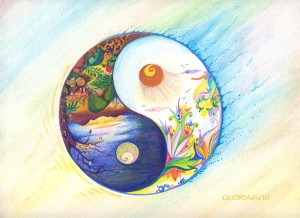Thomas King asks, “If this is your land, where are your stories” for a reason. Stories are narratives, sequences, plots, or events. A significant dichotomy that defines a story is its credibility. In other words, whether a story is nonfictional or fictional; true or false. Thomas King creates this same dichotomy when he pits the Aboriginal creation story and the European creation story against one another. If only one can be true, then the other must be false..
He begins with the Aboriginal creation story; a story told with a colloquial voice that follows Charm as she falls through the sky, into the water, onto the land and onto the rest of the world. In this world, everything begins with water. All of the animals work together to create the land that Charm needs to live and to give birth to her twins. The voice of the narrator has a childish fluidity that speaks to the reader like it would if it were spoken aloud. This voice does not deviate from the Aboriginal culture that it reflects, as Aboriginal culture is heavily characterized by orality and the power of storytelling.
Charm isn’t necessarily the most likeable character. She seems selfish, makes mistakes, and acts a lot like coyote in Green Grass Running Water. However, despite her flaws, Charm literally gives birth to the world when she gives birth to her twins. These twins are basically Yin and Yang. Upon my first read, I thought that one twin would be good and one twin would be evil. However, I learned that they were just different from one another. Together, these twins meshed both big and little pieces of both of them to create a world that reflected these similar, differing (but not opposing) characteristics. These characteristics were not good and evil, but black and white, Q and U, or peanut butter and jelly. These characters used what was unique about them to create a world that reflected their differences. This creation story ends with a cohesive, functioning world that results from exhaustive teamwork. This creation story ends well, and it ends happily.
I grew up in what I call a “demi-religious household”. By this I mean we went to church approximately three times per year: Christmas, Easter, and whenever my Nan visited. I mention this because I find it hard to appreciate the Genesis story with my demi-religious background. We always pretended to be religious, but we never really were. As a result I know enough about the bible to characterize it with the same degree of truth that I would the Aboriginal story. To recap: the Aboriginal story talks about a woman that miraculously becomes pregnant, falls from the sky, somehow lands in water, and gives birth to twins that create the world.
AKA: The bible is a big, fat narrative.
Like the question states, Genesis is narrated quite differently than Charm’s story. The narrator speaks with powerful intent. The voice is masculine, and speaks with a literate voice (a voice that is created through literacy). The story ends with Eve, a woman, who eats the forbidden fruit and is shunned to earth. She is punished for her mistakes and lives with Adam in chaos. Genesis begins with paradise and ends with the world. Genesis creates the world as a punishment to the woman, the weaker one, who disobeys the almighty and all-powerful God. Unlike Charm’s story of creation and birth, Genesis is about punishment and suffering.
Just for fun let’s dissect these stories and list the oppositions that exist:
- Colloquial narration vs. formal narration
- Orality vs. literacy
- Imperfect characters and teamwork create the world vs. imperfection that destroys paradise to create the world
- Positive ending vs. negative ending
- Women create the world vs. women destroy the world
At a first glance it’s easy for me to decide a good story and a bad story, much like I initially believed one of Charm’s twins to be good and the other evil. However, this would be an oversimplification. Instead, King creates this dichotomy to reveal these two stories as stories (narratives, sequences, plots or events). King doesn’t expose the reader to these stories in an effort to persuade the reader into believing one or the other. Instead, he creates this dichotomy under the umbrella of spirituality. Stories like these don’t need to be right or wrong. They can coexist in the world as stories. That’s really all they are, and that’s all King is really trying to show us.
———-
Works Cited
“Bible Summary – Genesis.” Bible Summary – Genesis. N.p., n.d. Web. 13 June 2015.
Dictionary.com. Dictionary.com, n.d. Web. 13 June 2015.
“Green Grass, Running Water Summary – ENotes.com.” Enotes.com. Enotes.com, n.d. Web. 13 June 2015.
MacNeil, Courtney. “The Chicago School of Media Theory Theorizing Media since 2003.” The Chicago School of Media Theory RSS. N.p., 2007. Web. 13 June 2015.



Hey there!
Great blog. I enjoyed your point of view towards religion, and making comparisons to creations stories, while being aware that they are simply narratives. While taking this course, I find it quite useful to be able to step back and view the religions and beliefs as stories, not giving them so much power to become something true. This aids at interpreting readings in our class, and you did a great job doing so!
Thanks for reading, Arianne!
I totally agree. I find that after re-reading stories many times over they begin to feel true. Even in psychology it’s been found that after telling a lie repeatedly over an extended period of time we start to believe our own lies; convincing ourselves of our own fictional stories through mere repetition. You’re right; it’s always important to take a step back and remind ourselves that many of these stories have no credibility, and at the end of it all they’re all really just stories!
🙂
Hi Hailey. Can you elaborate on what you mean when you write that King “creates this dichotomy under the umbrella of spirituality”? What do you mean by spirituality? Are both of the creation stories featured here spiritual, or is neither? If they are spiritual, then what kind of story isn’t, and vice versa?
Hey Kevin!
That’s a totally valid question. By spirituality I mean the abstract, or in other words, that which does not exist physically. I find that people look toward spirituality as a way of escaping what is physically in front of them. Death, for instance, is an unescapable, pessimistic, frightening truth. It’s really puzzling to think about purpose. I feel that creation stories are born out of a wholesome need for understanding. We’re humans, and we naturally seek to understand why things are the way that they are. Death is scary, so we look toward spirituality our “why”. Human existence and purpose are also puzzling concepts, so I feel we create these narratives in an effort to truly understand our “why”.
I hope this answers your question!
Cheers, Hailey
Hi Hailey!
Thank you for clarifying this aspect of your blog, I think its a really insightful way of approaching the stories by seeing them both as abstract creations. By highlighting your own relationship to the story of Genesis, I think you really helped emphasize the importance in stepping back and gaining perspective to better understand the relationship and equality of all stories under the “umbrella of spirituality”. Sometimes we can be blinded by our own predispositions to believe there is a hierarchy when it comes to stories and beliefs…but like you said, King’s use of dichotomies helps us realize they are rather silly. Great analysis!
🙂
Hello! Thank you for the interesting post.
I am interested in your juxtaposition of the two narratives. I think in the case of Genesis and the Old Testament it is worth considering where these stories actually came from rather than simply looking at what they have been for the past few hundred years. The stories of the Old Testament were the stories of a warrior tribe in the desert-that of the very early Jewish people thousands of years ago. Originally the OT stories were created from an amalgamation of other ancient cultures’ religious stories, as many other ancient myths were. The stories were told orally and eventually became a part of the tribe’s identity and religion. I think it is more fair to look at the story closer to when it first was told and first became a part of the Jewish history rather than after thousands of years of reappropriation, alteration, and bloody religious history. Obviously the OT story is more intense, misogynistic, violent, and aggressive. However to me this means that the Jewish people-a small tribe fighting for survival in the middle of the desert, surrounded by larger, ferocous tribes-needed origin stories that stressed the importance of following strict laws and strong leadership. What do you think about it? Do you think the stories at all reflect the needs a tribe may have?
Gretta
Hey Gretta!
That’s certainly an interesting way to look at it! For argument’s sake I was aiming toward the Victorian-European (mainly British) appropriation of the Bible. I think Thomas King was also going for something similar considering Genesis is a part of the New Testament, not the Old Testament.
To answer your question: Yes! I think that stories (particularly creation stories) reflect the human need for purpose. I’ll say to you what I said to Kevin above: I find that humans have a wholesome need for understanding why they are born, why they live and why they must eventually die. Creation stories (while they are stories) provide answers that make these questions less intimidating and more understandable. I consider this “why” to be a need of any tribe, and therefore I think these stories are comforting for the “why”s that exist.
Cheers,
Hailey
🙂
Thanks Hailey that’s an interesting point!
I think you might have gotten them mixed up, Genesis is the first book of the Torah and therefore also the first book of the Christian Bible’s Old Testament. Also interesting to consider the position of Jewish peoples when the New Testament was written if that’s also what you’re thinking about–seems to me like a very similar position to when the OT was written, just post-slavery. Do you think the Victorian Genesis was any different from the ancient Genesis? Or the Victorian interpretation? Both seem fairly misogynistic, violent, and absolutist to me. Also that’s a very valid point about the human need for stories in an existential sense but I think the social need for stories in a society is just as important and exposes elements of a society’s culture which may otherwise have proven elusive. I do believe that stories serve universal purposes, but I think the specific needs that different societies’ stories serve is mundane and necessary but also more interesting and complex.
Interested to hear your thoughts,
Gretta
🙂